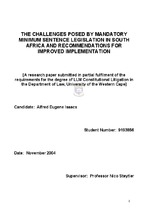| dc.contributor.advisor | Steytler, Nico | |
| dc.contributor.author | Isaacs, Alfred Eugene | |
| dc.contributor.other | NULL | |
| dc.contributor.other | Faculty of Law | |
| dc.date.accessioned | 2013-06-13T07:59:03Z | |
| dc.date.available | 2007/03/30 08:50 | |
| dc.date.available | 2007/03/30 | |
| dc.date.available | 2013-06-13T07:59:03Z | |
| dc.date.issued | 2004 | |
| dc.identifier.uri | http://hdl.handle.net/11394/1385 | |
| dc.description | Magister Legum - LLM | en_US |
| dc.description.abstract | Generally the Courts have a discretion to impose sentence. Violent crime was rampant in South Africa. The response of the legislature in dealing with crime was to enact legislation in 1997 like sections 51 to 53 of the Criminal Law Amendment Act 105 of 1997 which prescribe severe mandatory sentences for a large number of serious offences like murder, rape and armed robbery. This legislation come into effect on 1 May 1998 and was to have effect for two years. The President could with the concurrence of Parliament by proclamation extend its operation for one year, that was in fact done. The latest extension of the Criminal Law Amendment Act 105 of 1997 was for a further two years making the minimum sentence provisions valid until 30 April 2005. The Courts did not like these mandatory sentences because of the limitation it places on judicial discretion and dealt with this legislation that limited their judicial discretion restrictively in order to defend their sentencing discretion. Although the Criminal Law Amendment Act of 105 of 1997 was held not to be unconstitutional the Courts stll sought to give it a narrow interpretation. This research paper include an outline of the Criminal Law Amendment Act; the Constitutional challenges that were brought against the Criminal Law Amendment Act; the judicial interpretation of the Criminal Law Amendment Act as well as the applicability of the Criminal Law Amendment Act to District Courts and juvenile ovenders; the procedural requirements that must be complied with in the Criminal Law Amendment Act and its consequences if not complied with. This paper examined how the Courts defined substantial and compelling circumstances, the approaches adopted by the Courts and when deviation from the Criminal Law Amendment Act can take place. It also include the challenges posed by mandatory minimum sentence legislation as well as recommendations for the improved implementation of the Criminal Law Amendment Act. | en_US |
| dc.language.iso | en | en_US |
| dc.publisher | University of the Western Cape | en_US |
| dc.subject | Mandatory sentences | en_US |
| dc.subject | South Africa | en_US |
| dc.subject | Sentences (Criminal procedure) | en_US |
| dc.subject | Criminal Law Amendment Act 1997 | en_US |
| dc.title | The challenges posed by mandatory minimum sentence legislation in South Africa and recommendations for improved implementation | en_US |
| dc.type | Thesis | en_US |
| dc.rights.holder | University of the Western Cape | en_US |
| dc.description.country | South Africa | |

